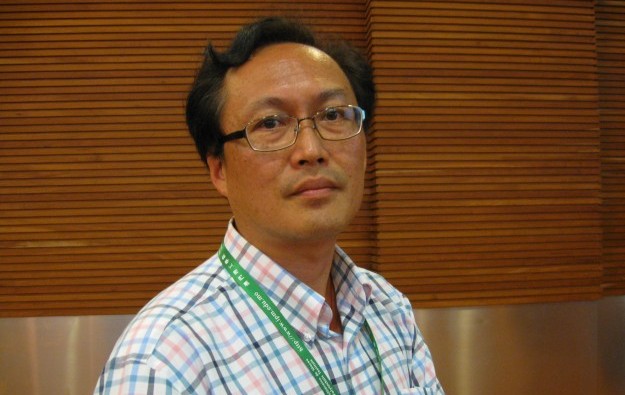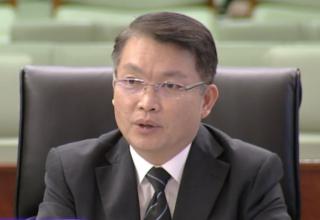Academic unveils year-long study of Macau junket trade
Aug 02, 2014 Newsdesk Features, Latest News, Macau

The number of junket rooms in Macau casinos fell 10 percent year-on-year in 2013 – to 220 from 243 in 2012 – according to data collected from private sources by Carlos Siu Lam (pictured), associate professor at the Gaming Teaching and Research Centre at Macao Polytechnic Institute.
During the same period, VIP baccarat revenue in Macau actually rose by 13 percent year-on-year according to publicly-available data from the city’s Gaming Inspection and Coordination Bureau (DICJ).
Nor is there necessarily a positive correlation between the number of VIP rooms in the market and the number of VIP tables. Takeovers within the junket sector – combined with casino operators setting higher targets for monthly junket roll in order to boost VIP yield per table in a market constrained by the government’s cap on table growth – has in some cases led to the creation of ‘super junkets’ occasionally using bigger junket rooms, say investment analysts.
There is however some indication from Mr Siu’s study of a positive correlation between the number of Macau VIP rooms and the macroeconomic conditions in the main feeder market for players, mainland China.
His data – going back to 2007 – indicate that between 2008 and 2009, when the effects of the global financial crisis hit the Chinese economy, the number of VIP rooms tumbled from 121 to just 69.
“These data are from a private source, and it’s not that easy to get the VIP room numbers,” Mr Siu said during a presentation at the International Conference on Gaming, Leisure and Entertainment 2014, held at Macao Polytechnic Institute on Wednesday and Thursday.
Publicly available data he also collated show the number of gaming promoters licensed by the gaming bureau has also fluctuated along with macro conditions. In 2009 they fell to 226 from 235 in 2008, and in 2013 they slipped to 235 from 288 a year earlier.
The numbers now revealed are part of a year-long study Mr Siu made into the Macau junket business that he says included face-to-face interviews with junket operators and government officials.
The interviews offered insights that wouldn’t otherwise be picked up by official data, but nonetheless used the official numbers as a starting point for inquiries.
Increasingly Chinese
Mr Siu said for example that the junket business in Macau is increasingly being run by people from mainland China. He indicated that is mainly because most of the players come from there and not from Hong Kong and Taiwan as they did in the early days of junkets starting in 1984.
In 1999, people from mainland China made up only 22 percent of Macau visitors. By 2013 they represented 63.5 percent of all tourists. In 1999, Hong Kongers made up 56.8 percent of all visitors. By 2013 that percentage of the total had fallen to 23.1 percent.
“Mainland visitors have created abundant business opportunities for the junket businesses in Macau, and this has created some changes in that business sector,” he stated.
A combination of factors including increased competition for business, pressure on margins and high career expectations, meant the younger generation of Macau people were showing less interest in joining junket operators, Mr Siu said.
Modern Macau junkets need staff that can commute between the VIP player’s hometown and place of business in China and Macau, actually accompanying the player. That is vital in a credit-based business where you need to know from day-to-day if the player is good for the money.
Commuting allows junket representatives, says Mr Siu, “to keep a close eye on the business situation of their premium patrons. They also have to accompany their patrons in person to avoid the patrons being lured away by other competitors [junkets]. Also these junket reps need to collect gambling debts.”
Junket sources told Mr Siu that they like if possible to recruit junket representatives from the players’ home area. Such mainland workers are also hungry for success and are even prepared to distribute business cards for the junket business in local streets back in mainland China, said Mr Siu reporting his findings.
Miserable conditions
“One interviewee said that nowadays young local [Macau] people do not want to be junket operators or representatives because of their ‘miserable’ working conditions. Junket operators do not have fringe benefits, they don’t have medical benefits – they have nothing at all. And they strictly follow the principle of ‘no prey, no pay’. In other words they need to look for ‘prey’ [new players] in order to get paid,” added Mr Siu.
“Before 2005, gamblers from China didn’t have much opportunity to gamble legally [in Macau], so didn’t have much idea about the junket commission system. But now mainland China gamblers know about the junket business and know how to negotiate the terms with the junket operators, including postponements or discounts on their gambling debts,” said Mr Siu.
The difficulty of checking up on documentation back in mainland China also created barriers for junket operators and representatives from Macau, stated the academic.
“A lot of things can be fake in China. Even if a VIP customer gives you a mortgage document [as gambling collateral] with very good terms, sometimes local [Macau] people dare not accept that bill [document] because they are not very clear about the conditions in mainland China. This means junket operators from mainland China have an edge.”
He added: “Some junket operators from mainland China have started to buy VIP rooms in Macau. In some cases you can find that the nominal owner of the VIP room in Macau could be a Macau citizen, in order to have a local face for the government.”
In a separate presentation at the same conference, professor Sonny Lo Shiu Hing, from the Hong Kong Institute of Education, suggested the Macau authorities had “implementation gaps” in aspects of crime control and junket operations.
“The relatively close government-business relations in Macau means that the government is hamstrung by the influential casino capitalists and that it refrains from formulating and implementing casino-related policies that are drastically departing from the status quo,” stated Mr Lo.
“The government should exert more power to better monitor the junket industry. At present, supervision seems to be enough but maybe the government may like to increase its supervising capacity preparing for the future,” suggested the scholar.
“Laws and regulations are repeatedly ignored, with a large number of unlicensed junket operators,” that don’t show up in the official figures for DICJ-licensed gaming promoters, asserted Mr Lo.
Related articles
-
 Philippines reformed junket AML, site...
Philippines reformed junket AML, site...Oct 28, 2024
-
 Macau 3Q mass baccarat GGR up 12pct on...
Macau 3Q mass baccarat GGR up 12pct on...Oct 16, 2024
More news
-
 GKL provides its new table game...
GKL provides its new table game...Nov 22, 2024
-
 The Baron Upright, a new cabinet from...
The Baron Upright, a new cabinet from...Nov 22, 2024
Latest News
Nov 22, 2024
Casino operator Grand Korea Leisure Co Ltd (GKL) says it has achieved its first commercialisation of a new-to-market table game, developed via an in-house competition dating to 2021. Grand Korea...Sign up to our FREE Newsletter
 (Click here for more)
(Click here for more)
Pick of the Day
”As we navigate the final steps of the licensing process, we remain confident in our ability to align with Brazil’s regulatory requirements”
Eusebio Tanco
Chairman of DigiPlus Interactive
Most Popular
 Macau to get 36mln visitors in 2025: Secretary Lei November 21, 2024
Macau to get 36mln visitors in 2025: Secretary Lei November 21, 2024  Gaming technology firm IGT reports hacking incident November 21, 2024
Gaming technology firm IGT reports hacking incident November 21, 2024  EBITDA a focus in Macau market share battle: Jefferies November 21, 2024
EBITDA a focus in Macau market share battle: Jefferies November 21, 2024  Macau 2025 GGR could top US$30bln govt forecast: Citi November 20, 2024
Macau 2025 GGR could top US$30bln govt forecast: Citi November 20, 2024  Macau big-event outdoor venue gets trial run Dec 28: CE November 20, 2024
Macau big-event outdoor venue gets trial run Dec 28: CE November 20, 2024









